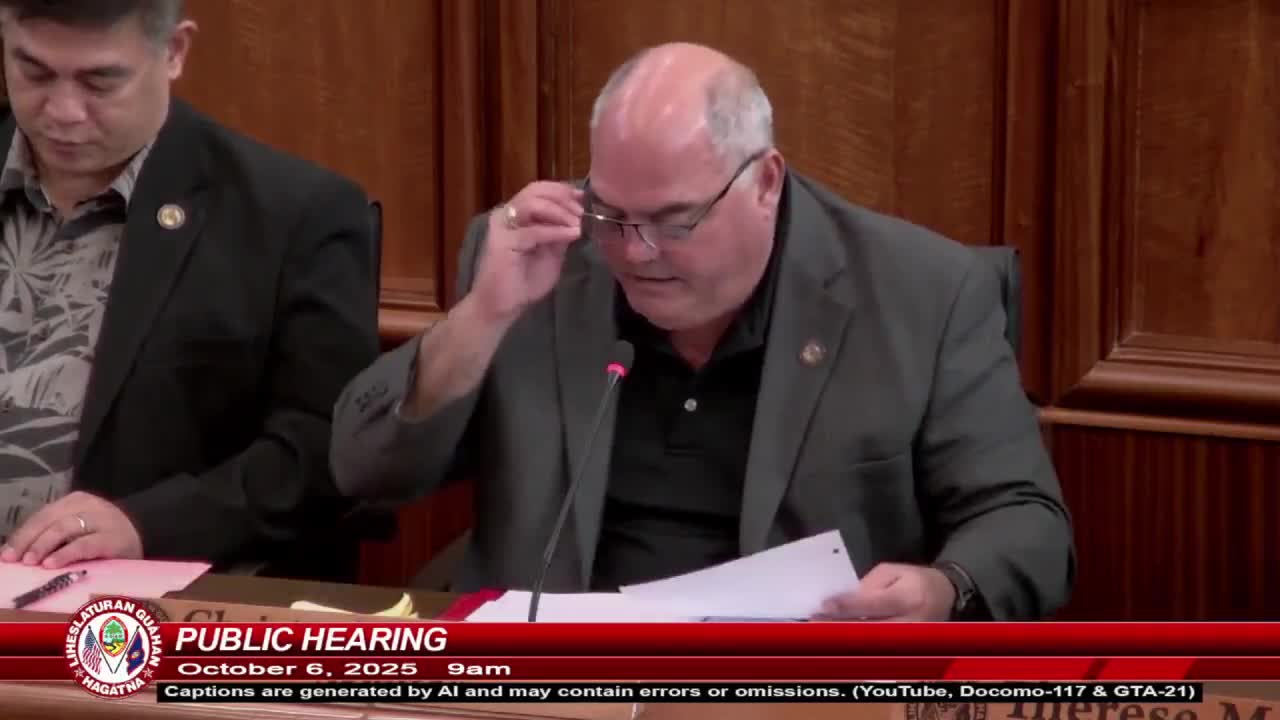Guam Memorial Hospital leaders, GEDA and legislators outline $32M proposal; fiscal office says $19.7M is available for FY2026
Get AI-powered insights, summaries, and transcripts
Subscribe
Summary
Two bills presented Oct. 6 would direct bond-refinancing savings to Guam Memorial Hospital Authority; witnesses described life-safety needs and an electronic health record but the debt-service savings available for FY2026 differ across documents.
Senator Sabrina Salas Montanani, author of Bill 187-38 COR, told the Committee on Finance and Government Operation on Oct. 6 that her draft would appropriate $32 million in savings from recent bond refunding to the Guam Memorial Hospital Authority for critical capital-improvement projects and life‑saving supplies.
"This bill takes $32,000,000 in savings from the government of Guam's bond refunding… and I want the people of Guam to know that I am committed to making sure every dollar of these savings goes directly to the Guam Memorial Hospital," the senator said. She told the committee she is coordinating with hospital leadership to prioritize projects and expects committee amendments to reflect the fiscal-year timing of available savings.
Dr. Jolene Ogan, interim CEO/administrator for Guam Memorial Hospital Authority, testified the facility faces life‑safety and infrastructure problems and listed four program priorities she said the funds would address: demolition/parking and site work around an abandoned MRI building; utility and life‑safety modernization (electrical, fire alarm, elevator and emergency power); an electronic health record (EHR) implementation; and emergency‑readiness upgrades including HVAC and alternate-care‑site conversion. "Our hospital is at a breaking point," she said, describing roof, electrical and fire‑protection problems identified in engineering assessments.
Dr. Eusebio, testifying alongside Ogan, urged investment in an integrated EHR and other system upgrades that would improve patient safety and billing accuracy and that could be migrated to a future new hospital. Ogan and GMHA staff proposed allowing modest reprogramming within the listed project categories so GMHA can adjust between line items without exceeding the total appropriation.
Tina Garcia, chief executive/administrator of the Guam Economic Development Authority (GEDA), told senators that the bond refunding closed in August and that GEDA's numbers show a FY2026 debt‑service reduction of about $19,745,714 available for appropriation now. Garcia and the committee's fiscal chair explained the governor's substitute budget had recognized savings differently, which led to differing draft appropriation amounts in the bills introduced by different senators.
Hospital operations and finance staff told the committee how recently enacted appropriations and the $40,000,000 earlier provided to GMHA interact with the new proposals. GMHA officials said $10,000,000 of the $40,000,000 is being held for IT and an electrical panel project; roughly $24.6 million of the $40 million had been paid to vendors as of late September, the hospital reported, leaving about $400,000 in that tranche still processing.
GMHA officials said the $19.7 million identified for FY2026 could support the project list with the exception of a second‑year EHR funding tranche described in the GMHA plan. Hospital representatives emphasized their priority is life‑safety systems — fire alarm, emergency power and elevator upgrades, mold mitigation and electrical modernization — even while acknowledging staff and parking needs.
Committee members asked for more detail on vendor payables, the hospital's outstanding accounts‑payable balance and procurement bottlenecks. GMHA officials said payables had been reduced using the $40 million appropriation and that some procurement and long‑lead items (particularly IT and equipment) will require 6–12 months for acquisition and installation. GMHA requested help from the legislature on procurement bottlenecks and oversight was promised by committee chairs.
The committee did not take a final vote. Members said they will hold markups to align bill language with available savings and to identify any emergency procurement waivers or process changes to speed projects. Senator Salas Montanani said she will work with GMHA and the committee to produce amendments reflecting actual FY2026 availability and project priorities.
Why this matters: GMHA leaders described infrastructure and IT risks that hospital witnesses and the U.S. Army Corps of Engineers' assessment identified as life‑safety issues. The committee must match appropriation language with funds actually available in FY2026 and balance immediate hospital safety needs against scheduling, procurement lead times and prior appropriations already in flight.
Next steps: Committee plans markups and a joint oversight/roundtable with GMHA and the public auditor to review procurement and payables and to refine project language before any floor action.
